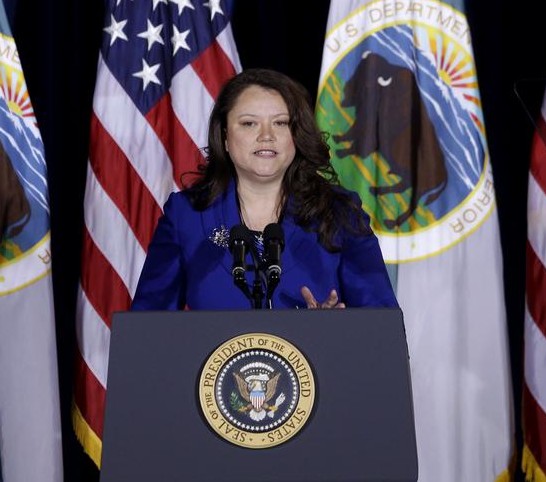Source: Quinault Nation
TAHOLAH, WA (6/26/13)–“This is an exciting development in advancing a new era of U.S.-Tribal relations,” exclaimed Fawn Sharp, President of the Quinault Indian Nation and the Affiliated Tribes of Northwest Indians regarding today’s establishment of the White House Council on Native American Affairs by President Barack Obama.
President Obama established the council in an executive order with the stated objective of promoting and sustaining “prosperous and resilient Native American tribal governments” and in recognition of a government-to-government relationship with tribes throughout the country. “This relationship is set forth in the Constitution of the United States, treaties, statutes, Executive Orders, administrative rules and regulations, and judicial decisions. Honoring these relationships and respecting the sovereignty of tribal nations is critical to advancing tribal self-determination and prosperity,” says the executive order.
“This executive order comes from a President who has taken the time to listen to the American Indian people. It is a document that recognizes our history and struggles and acknowledges our interests and objectives. On behalf of the Native people and the tribes I represent in my elected capacities, I thank him for his foresight and the intent of this very important decision,” said Sharp. The White House Council on Native American Affairs is primarily coordination. But it could benefit Tribes by addressing the chronic problem of tribal government and tribal program underfunding which had ranged from 50 to 80 percent, said Sharp.
Sharp pointed out that the council is to coordinate its policy development through the Domestic Policy Council which tends to create yet another layer of a federal policy process and was more direct through inter-agency collaboration. There does not appear to be a mechanism for direct tribal government engagement with the Council on “tribal specific” policy and the establishment of effective inter-governmental negotiation mechanisms. The new Council appears to be solely concerned with federal funds, but may not address the conveyance of funds through states to Indian governments. Finally, President Sharp pointed out that the new council does not appear to be concerned with urban and rural Indians and Alaskan Natives and Hawaiian natives now constituting more than half of the total native population in the United States.
The Executive Order goes on to say, “As we work together to forge a brighter future for all Americans, we cannot ignore a history of mistreatment and destructive policies that have hurt tribal communities. The United States seeks to continue restoring and healing relations with Native Americans and to strengthen its partnership with tribal governments. Our more recent history demonstrates that tribal self-determination — the ability of tribal governments to determine how to build and sustain their own communities — is necessary for successful and prospering communities. We further recognize that restoring tribal lands through appropriate means helps foster tribal self-determination.”
The Executive Order establishes a national policy to ensure that the Federal Government engages in a true and lasting government-to-government relationship with federally recognized tribes in a more coordinated and effective manner, including by better carrying out its trust responsibilities. This policy is established as a means of promoting and sustaining prosperous and resilient tribal communities. “Greater engagement and meaningful consultation with tribes is of paramount importance in developing any policies affecting tribal nations,” it reads.
Among other policy direction, the order asserts that it is the policy of the United States to promote the development of prosperous and resilient tribal communities by promoting sustainable economic development, greater access to health care, improvement of tribal justice systems, greater educational opportunities and improved protection of tribal lands, natural resources and culture.
The chair of the new council will be the Secretary of Interior and members will include the heads of numerous federal executive departments, agencies and offices. The order lays out funding sources, meeting frequency, processes for making recommendations to the President and various other objectives. Interior Secretary Sally Jewell has stated she will announce further details related to council as soon as tomorrow.
The formation of a White House Council on Native American Affairs recalls the Johnson and Nixon Administrations’ Council on Indian Opportunity (1968-1974) which was chaired by the Vice President of the United States, said Sharp. Like the Johnson and Nixon Council the new White House Council is intended to coordinate federal programs and the use of resources to be delivered to tribal communities. Unlike the earlier Council, the new 31 member Council does not have representatives of tribal governments. Unlike the earlier National Council, the White House Council does not have actual broader policy powers since the earlier body actually conducted meetings around the country, had the Vice President as the Chair and included officials from both the US government and tribal governments.
“It is true that the tribes have struggled tremendously through the decades in this country. But from generation to generation we have also proved our resiliency. We have endured much, and even today there are many who fail to understand us. We do appreciate President Obama’s intents and actions. But as we proceed in the improvement of the federal/tribal government-to-government relationship, it is important that tribal leadership be included in the planning and implementation process at every opportunity,” said Sharp.
“The bottom line is that it is no small thing that the president is doing here, just as it is no small thing that he has embraced Indian Country*. Again, I thank him for his wisdom, his heart and his foresight,” said Sharp.
*In May 2008, Barack Obama became the first American presidential candidate to visit the reservation of the Crow Nation. During his trip he was adopted by Hartford (now deceased) and Mary Black Eagle as a member of the nation. Hartford chose the name “Awe Kooda Bilaxpak Kuxshish,” or ”One Who Helps People Throughout This Land” to formally give to Obama, and the President has had the wisdom and sensitivity to embrace his adopted name and family with dignity and respect.
White House Council on Native American Affairs Executive Order in full:

